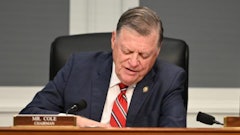
When news broke that the U.S. Department of Health and Human Services had sent a recommendation to the Drug Enforcement Administration to reschedule cannabis in late August, it came as a welcome surprise for many.
HHS Secretary Xavier Becerra had originally said a recommendation would be ready before the end of this year, prompted by an October 2022 directive from President Joe Biden that the agency review cannabis’s Schedule I designation as one with a “high potential for abuse” and no accepted medical use. Although cannabis advocates would argue it’s long overdue, the ahead-of-schedule announcement provided an immediate and much-needed infusion of optimism in the industry.
Shane Pennington, partner with Porter Wright Morris & Arthur, called the HHS Schedule III recommendation “one of the biggest events in the history of American drug law,” during a conversation about rescheduling misconceptions with CBT Editorial Director Noelle Skodzinski, excerpts from which are published in The Last Word. “It’s hard to overstate what a big deal it is,” he said.
Kris Krane, director of cannabis development for KCSA Strategic Communications, called it a “historic announcement,” as it marks “the first time that a government agency, the Department of Health and Human services no less, has recognized that cannabis has medicinal value and a lower potential for abuse,” he said. “This … marks one of, if not the most comprehensive reviews ever conducted by the federal government on the issue.”
The DEA makes the final call, and many are tempering their excitement, as it’s unclear what the agency, which has denied all previous attempts to remove the plant from Schedule I, will ultimately decide. Others believe rescheduling is not enough, and that removing cannabis from the Controlled Substances Act altogether is the only path to real policy reform.
Debates about the possibilities and implications of rescheduling were still brewing when, in mid-September, the Senate Banking Committee scheduled a meeting to review the SAFE Banking Act and released a revised version, including a new title: the Secure and Fair Enforcement Regulation (SAFER) Banking Act of 2023—with the addition of the word “regulation” ahead of the scheduled markup on the bill. (Note: This issue went to press before the scheduled markup on Sept. 27.) The scheduled review will be the first Senate action on the bill, which has passed seven times in the U.S. House since 2019. Keep checking CannabisBusinessTimes.com for updates on these stories and much more.
These positive, historic happenings come amidst what has been a particularly tumultuous and sometimes defeating 18 months in the cannabis industry. One example is the unclear and changing testing regulations rolled out in Oregon earlier this year, yet another hurdle for growers in a market particularly bruised by price compression, oversupply and increasing operating costs. This month’s cover story by CBT Digital Editor Eric Sandy provides a deep dive into how growers are faring in one of the earliest adult-use cannabis markets and where new Aspergillus testing regulations—which some growers said have put them out of business–came from. But there is good news to report there, too, and one encouraging announcement, included in the story, came just as we were sending this issue to press.
This streak of hopeful news reminded me of a quote from one of the Cannabis Conference 2022 keynote speakers.
“[The industry] is going to go back up,” Mitchell Baruchowitz, the founder and managing partner of Merida Capital Holdings, told the audience at Paris Las Vegas about the cannabis market. “There will be wind in our sails, and it’s not always going to be a headwind.”
The tides appear to be changing, and we’re hoping for smoother sailing for the cannabis industry moving forward.
























